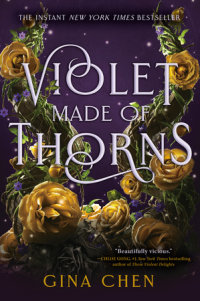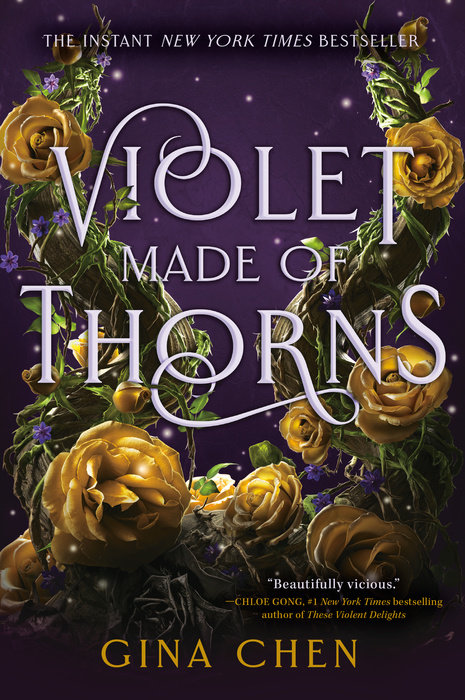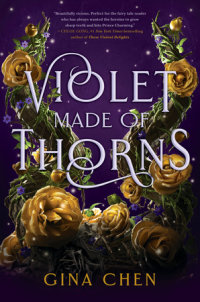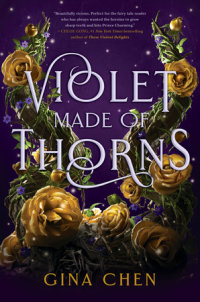Violet Made of Thorns
"Beautifully vicious. Perfect for the fairytale reader who has always wanted the heroine to grow sharp teeth and bite Prince Charming."—Chloe Gong, #1 New York Times bestselling author of These Violent Delights
A darkly enchanting fantasy debut about a morally gray witch, a cursed prince, and a prophecy that ignites their fate-twisted destinies—perfect for fans of The Cruel Prince and Serpent & Dove.
Violet is a prophet and a liar, influencing the royal court with her cleverly phrased—and not always true—divinations. Honesty is for suckers, like the oh-so-not charming Prince Cyrus, who plans to strip Violet of her official role once he’s crowned at the end of the summer—unless Violet does something about it.
But when the king asks her to falsely prophesy Cyrus's love story for an upcoming ball, Violet awakens a dreaded curse, one that will end in either damnation or salvation for the kingdom—all depending on the prince’s choice of future bride. Violet faces her own choice: Seize an opportunity to gain control of her own destiny, no matter the cost, or give in to the ill-fated attraction that’s growing between her and Cyrus.
Violet’s wits may protect her in the cutthroat court, but they can't change her fate. And as the boundary between hatred and love grows ever thinner with the prince, Violet must untangle a wicked web of deceit in order to save herself and the kingdom—or doom them all.
An Excerpt fromViolet Made of Thorns
1
Today, Prince Cyrus returns to the capital with a bride, or else.
From the Seer’s Tower, the tallest point in the Sun Capital, I can see a train of purple banners fluttering amid the fields outside the city--the royal caravan making the steep approach to the south gates. Cordoned-off crowds pack the streets, waiting to welcome their prince home. Six months have passed since Cyrus departed to tour the continent, since he set out to “seek from the land and its generous people all the wisdom” that he could not learn in a palace.
Or something like that. I stopped listening to his going-away speech midway through.
Mostly, his tour was to find a bride--a solution to his curse. Cyrus didn’t mention that in his speech. I know this because his father, King Emilius, berated him afterward for the omission; then I had to mention it in my speech, a few days later, when I announced that I dreamed a new prophecy.
The best part about being Seer isn’t the tower or the amenities or the access to the king. It’s how easily everyone believes what you say.
“The capital was less lively without His Highness. I do miss those girls running amok, trying to save him,” says the peach-faced woman sitting at my divining table. “I suppose that will change for good. He’s chosen our next queen by now, hasn’t he?”
If Cyrus listened to me, he would have. “He better,” I mutter, turning from the window.
“Pardon?”
“I said, he met her.” I flash an enigmatic smile at my lone patron. With the caravan’s return, I didn’t expect anyone to visit my tower today. This woman has the weathering of someone too practical to line up for a peek at a royal face: a brimmed-hat tan and calloused hands, turned upward on the divining table’s marble surface. “If you speak of the prophecy I received before His Highness left, my dreams told me, ‘Prince Cyrus will meet his bride before his journey’s end.’ No more than that, no less.”
She nods. “I didn’t recall the exact words you used--”
“The exact words are important.” I paced this room for four nights to decide on those words, and I won’t have them misremembered now when they finally matter. Picking up my robes, I take a seat across from her and push my heavy braid over my shoulder. The sooner this reading is over, the sooner this small talk can end, and I can leave for the palace and greet the prince myself. “What is it that you want me to see?”
The woman’s brow twitches. My curtness offends her, though she won’t say so. “My only concern is the harvest season, Sighted Mistress Violet. Anything regarding my farm’s future. I pray the Fates be kind.”
I don’t like doing these fortune readings, but the king insists I interact with the populace regularly so they trust the girl behind their kingdom’s prophecies. It was either this or matchmaking, and seeing buffoons in love makes me want to empty my stomach.
I lay my hands over hers, and the brush of my fingers against her skin sparks something sun-bright in my mind. I shut my eyes and focus on the grooves of her palm, the folds and scars, the blood that pumps underneath--any physical mark of her history that I can use to anchor my magic. In my mind’s Sight, I find the threads that bind her soul to the turning of this world:
A hillside farm, golden with fayflowers.
Rides to the Sun Capital, part of her monthly routine.
A different farm in the borderlands. Family? A lover’s home? The Fairywood looms on the horizon.
Long days of fieldwork stretching into nights . . .
And so they go.
The clearest threads are ones that have already happened--her memories. Future threads, on the other hand, look hazy and can even be contradictory. The Fates are fickle gods, and fortunes are always changing. If I can’t see the future directly, I might feel the Fates’ intentions instead: foreboding feels like the wet gust before a storm; opportunity, like a dip into warm honey. But much of the time, the Fates don’t like showing their hands.
Not unless they mean to, anyway.
My patrons have to deal with what little I see. I’m the only Seer in the Kingdom of Auveny, the only choice they have. This is not a coincidence. There are nine known Sighted in the world, every one of us in the employ of various courts--we’re too useful to be left alone. I hear that one Seer in Yue, in addition to her prophecies, can predict storms from the ripple of a pond, and another in Verdant knows the date of every birth.
I’m the youngest Seer at eighteen, plucked from the Sun Capital’s very own streets seven years ago. All I know how to do is dream, read threads, and lie.
“I don’t think you need to worry,” I murmur as my Sight peers into the fog of the woman’s future. I embellish my vague visions with details from her memories. “Your fayflowers should grow fine this year. But stay diligent. Don’t wander so much, maybe, and keep to your farm.”
When I open my eyes, the woman withdraws her hands. “Kind Fates--that’s very good to learn,” she says. “Anything else?”
I ramble until she’s finally satisfied. Thanking me, she throws silvers into the dry fountain basin that’s become a vessel for offerings and departs my tower.
I peek over the fountain’s scalloped rim and sigh. I don’t rely on the coin, since the palace provides everything I need, but under the previous Seer, the fountain overflowed with offerings. Under my tenure, it’s gotten . . . dusty.
And now that Cyrus has returned, my reputation will only get worse.
The din outside rises and falls with cheers. I barely need to glance at the window to know the royal caravan is inside the city. The court has been scheming over Cyrus’s homecoming practically since he left. King Emilius has grown more sickly, and Cyrus is expected to ascend to the throne before the end of the year. The time to make an attempt for his favor is now.
My teeth grind. That goes for me, too.
Seven years ago, Sighted Mistress Felicita--stars guide her soul--uttered her final prophecy:
“The land will bloom red with blood and roses and war. The prince--his heart will be damnation or salvation. His choice may save us all. His bride--it is up to her! A curse, a curse, accursed curse--gods, be wary--”
And that was all before she died. A maidservant who attended her sickbed claims the Seer’s mouth was frozen wide, her fist clenched by her neck, as if she had been fighting against someone in order to speak. Even in death, they couldn’t uncurl her body.
The kingdom plunged into paranoia. Was Felicita heralding the end of Auveny? The end of the world? Why was Prince Cyrus the catalyst? I became the new Seer after her death, but I was just a child then, a waif play-acting in silk, confused as everyone else. I never dreamed of what Felicita described.
My lack of answers didn’t endear me to anyone.
We sought aid from Seers serving in neighboring lands and warned them in turn, but even they couldn’t sense any coming omens. The grandmotherly Seer of Balica had us consider that perhaps--if Felicita wasn’t simply fever-mad--it meant that whatever she saw was far in the future. We had time to prepare.
And so, with every new season, every gala, every visiting dignitary, the kingdom has held its breath, hoping for Cyrus to fall in love. Felicita’s prophecy was clear enough here: the future rests in the prince’s heart, his choice, his bride.
In seven years, Cyrus hasn’t chosen anyone. A sinister prophecy on his shoulders and he’s decided to be picky.
But he can only stall for so long.
I head to the palace to witness the results of his tour myself. It’s a short walk, thanks to the bridge connecting my tower’s entrance to the north end of the palace grounds. Without it, I’d have to trek down two hundred stairs to the tower’s base, sitting far below on the banks of the river Julep. The Seer’s Tower is a gnarled relic of the Fairywood that once covered the continent--grown, not built, so it was never crafted for practicality.
Tales say that one of the first Seers drew the walls out of the ground and raised them high so that she could live among the stars. Feats like that used to be common, supposedly, when the Fairywood was wide, nations were few, and the land seeped magic. I might not have believed it if I didn’t sometimes dream of long-past threads--of times when trees were taller than mountains and canopies were lit with fairies and we humans weren’t the cleverest creatures wandering the forests.
Today, the Seer’s Tower is simply out of place. It juts into the sky like a fang, a trunk of petrified vines rising from the riverbanks, stark green against the developed city. A breeze tangles through my robes as I cross the bridge away from it. The views of the Sun Capital disappear behind the marble berth of the palace and its gold-tipped spires. I pass through a set of gates, and the gardens unfold before me: a patchwork of neat flowerbeds, carved fountains, and ornamental trees.
On the way, I receive a few greetings: a quick bow or curtsy, along with a murmur of “Sighted Mistress”--others know that I don’t care for formalities. Stealing down a narrow caretaker’s trail on tiptoes, between the hedge maze and a row of newly trimmed begonias, I arrive at one of the palace’s back entrances with only a bit of dirt on my slippers.
Inside, every room and hallway is filled with chatter. A frown stitches itself across my face; I’m troubled by what I overhear. What I don’t overhear.
I ascend the staircase to the royal living quarters and the conversations fade away. The guards outside Cyrus’s rooms look uneasy as I approach, but they don’t stop me.
I throw open the double doors to his bedroom.
“Do not let her in--Violet, leave.”
My eyes land on Cyrus by his wardrobe. The prince is dressed, mostly. And--ugh--handsomer than before.
Cyrus Lidine of Auveny is cut from the cloth of storybook dreams: dashing, well-read, witty if he deigns to speak to you, and beautiful even without fairy glamours. He could make a sack look fashionable, and his smile is responsible for more fainting spells than the summer heat.
Now at the wane of his nineteenth year, he’s filled out his height, muscle smoothing out the angles of his adolescence, his clothes no longer pinching at junctures, since he’s done growing. Color has returned to his cheeks, once porcelain-pale after a bout of childhood illness. He’s shed his boyishness with a fresh cut of his copper hair.
But some things never change, including the disdainful gaze he levels at me as I do not leave. These months apart haven’t tempered the loathing between us.
A lifetime apart wouldn’t.
“You can’t come barging in here--” Cyrus starts.
“And yet I just did,” I murmur, glancing around the room. I’m the only other person here, which is a problem. The bed is unrumpled. His bath seems empty. I saw no retinue downstairs, no court ladies huddled around some latest addition to Sun Capital society. So it begs the question: “Where is she?”
Cyrus turns to the mirror and resumes buttoning his vest. “Who?”
“Her future Majesty. The girl you’re marrying.”
“None of your business.”
I march over, braid swinging. “Entirely”--I wedge myself between Cyrus and the mirror as he heaves a heavy sigh--“my business.” If I wasn’t underfed during my early childhood, I might have grown enough to be eye level with him. As it is, he’s a hand taller, and I have to jut out my chin to glare at him. “I foretold that you would find a bride, and here you are, with no one in your arms. Do not make me a liar.”
“Then you shouldn’t have lied.”
My eyes narrow. Cyrus ignores me, shrugging on a bird-patterned jacket.
It was just a small lie, something to smother talk. Last autumn, there were reports of Fairywood turning black near the borderlands, of bloodred rose petals blowing through villages at night. People were getting anxious, so King Emilius asked me to search the future for any clues or elaborations about Felicita’s prophecy.
But my nights were fruitless, my dreams frustratingly empty.
So as Cyrus left on his tour, I made something up to calm the court:
Prince Cyrus will meet his bride before his journey’s end.
A small lie goes down like overwatered wine. You hardly notice it, and if you do, it isn’t a big enough problem to complain about. Cyrus needed to find a bride eventually. All I did was give him a timeline.
“Fine,” I say, arms crossed. “I didn’t really dream that you’d find your bride. I shouldn’t have had to. You should have chosen someone by now.” You could pave a footpath with the admirers swooning in the streets for him. How difficult can it be? “As long as Felicita’s prophecy hangs over your neck, people will be afraid of it, and they’ll fear for your reign, too. They call you cursed. Not to your face, clearly. I bought you time, Princey--time and optimism.”
Checking his cuffs, Cyrus tweaks the lion’s head–shaped buttons, continuing in his bored drone, “More concerned with appearances than the prophecy itself, I see.”
I flash teeth. “I can be worried about two things at once.”
“Of course: your precarious reputation, and my father’s opinion of you.”
“The latest patrol reports came back last week. They found rotting trees in the Fairywood.”
“I’m aware. I saw it.” He finally stops fussing with his clothes and lowers his gaze to mine; disquiet frames the green of his eyes, but I don’t behold it for long before he glances away. “My father should have already sent troops to burn it away.”
“But the root of the problem--”
“--might be Felicita’s last prophecy, yes, but I can’t do anything. I don’t get to decide when or with whom I fall in love.”
Felicita’s prophecy only mentioned a bride--love doesn’t have to play a part in it--but Cyrus is a romantic; he thinks it matters. Otherwise, he’d be celebrating his third anniversary with an arranged Verdantese princess by now. “You’re not even trying,” I scoff.
Cyrus only shakes his head. “I’m not giving false hope the prophecy will be broken. That’s all there is to it.” He pivots toward the bedroom doors.
I follow on his heels, out of his quarters and into the hallway, where courtiers are milling about. They turn to the prince with lighted eyes and ready questions. Cyrus flaunts a dazzling smile before dropping it sharply as soon as he jogs down the stairs, avoiding them all. Two guards fence him off, but I slip through.




